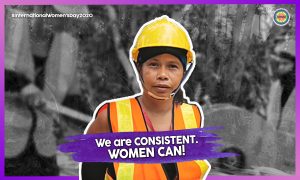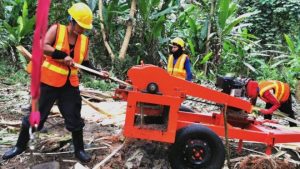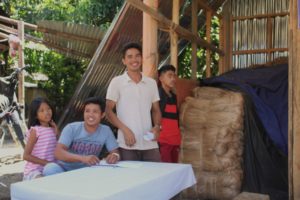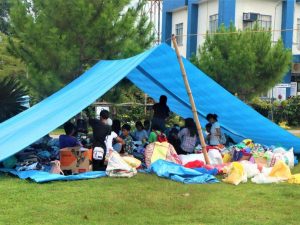Indeed, women can.
She excitedly smoothed out her worker’s vest and straightened her hard hat.
“I was surprised by this uniform. It is the first time we wear something like this to work on an abaca farm,” she said proudly as she shuffled her working boots. “We are used to wearing slippers in the farms, exposing us to danger like snakes.”

Maribel Dalayao, 37, a member of the Higaunon tribal community, is one of the two women in the newly formed 10-member production guild organized by EcoWEB through a project supported by Bread for the World. This production guild of trained abaca harvesters is hired by multinational company NewTech Pulp Inc. to harvest and extract fiber from around four hectares of Abaca farm inside their plant at Balo-i, Lanao del Norte.
Being a mother of six, she helps her husband in some farm work, hoping to augment their meager income. But according to her, their abaca farm is a failure. It does not meet the standards and they lack the necessary knowledge and skills to produce high-quality fiber. Since the end of last year, abaca buyers refuse to buy low-quality fiber and many of the farmers are left with their unsold abaca fiber. Some still wait for the ban to be lifted. It was in this situation that Maribel and her husband joined the training for abaca harvesters given by EcoWEB.
When she was asked about what she can do, she proudly said that she knows how to use the decorticating machine to strip abaca fiber, a task in the production process traditionally done by men. She also demonstrated how to prepare abaca leaf sheaths for stripping. She went on explaining how to select mature trunks for harvesting and how it is crucial in producing high-quality fiber.
With this newfound knowledge and skill, she is confident to be able to get a stable job as a harvester – something she intends on doing along with her own plans of developing their own family farm.
“This is a good way to earn money,” she added. “I hope we get more training on how to operate and maintain a decorticating machine. Our group needs these skills to be able to produce high volume of quality fiber.”

Maribel at work with one of the decorticating machines
“I encourage wives to learn this skill. True, women might be a bit slow but we are consistent .
We can also carry abaca trunks and strip them ourselves. Women can use the deco machine. We can do what men can do .”
By investing in women-friendly types of machinery, though more expensive, like the double-fed decorticating machine that Maribel loves to use, women could play an important role in abaca production.
“I hope that we can continue this kind of activity so that we can help other women become productive because, in these times, wives and husbands must work hand-in-hand for their children,” Maribel ended.
ECOWEB hopes to replicate this success to create more specialized production guilds that provide more opportunities for women, supporting their participation in the family’s income-generating activities. This provides women extra money to spend on things not usually prioritized, like health and education.
Maribel’s is the start of more interesting stories that show how indigenous peoples of Northern Mindanao, such as those from the Higaunon and Subanen groups, protect and develop their ancestral domains—one family at a time.

ECONOMIC SITUATION IN THE AREA
Most of the IPs are subsistence farmers and dependent on harvesting forest products. In Bayug-Iligan AD, abaca, falcata (paper tree), corn, rice , coffee are the major produce. But despite the vast potential of the AD in terms of land and natural resources, due to lack of development opportunities, many of the young IPs have migrated to cities and engage in wage-earning activities such as tricycle driving, household help, among others, leaving behind their underdeveloped vast tract of lands. Since huge potential portion of the ancestral domain areas are now accessible by road, non-Higaunon and non-Subanen settlers coming from the lowlands are also encroaching and land speculations and investment for plantations such as on abaca, cacao and coffee are increasing but not necessarily ensuring benefit for the IP community members.
Corn and rice are among the traditional crops by Higaunons but its productivity is decreasing due to increasing infertility of the soil due to unsustainable farm practices and continued use of chemical inputs. Being an endemic crop to the area, IPs are also encouraged to enhance and expand their abaca farms. Abaca is a traditional crop that is grown in small-scale for making ropes. At present, there is an increasing number of IP farmers cultivating abaca however, they need support to improve their production.
To help augment limited income, many IP women are also observed to have engaged in various small businesses like engaging in buy and sell of urban goods including cosmetics, clothing, wellness products and kitchen utensils.



